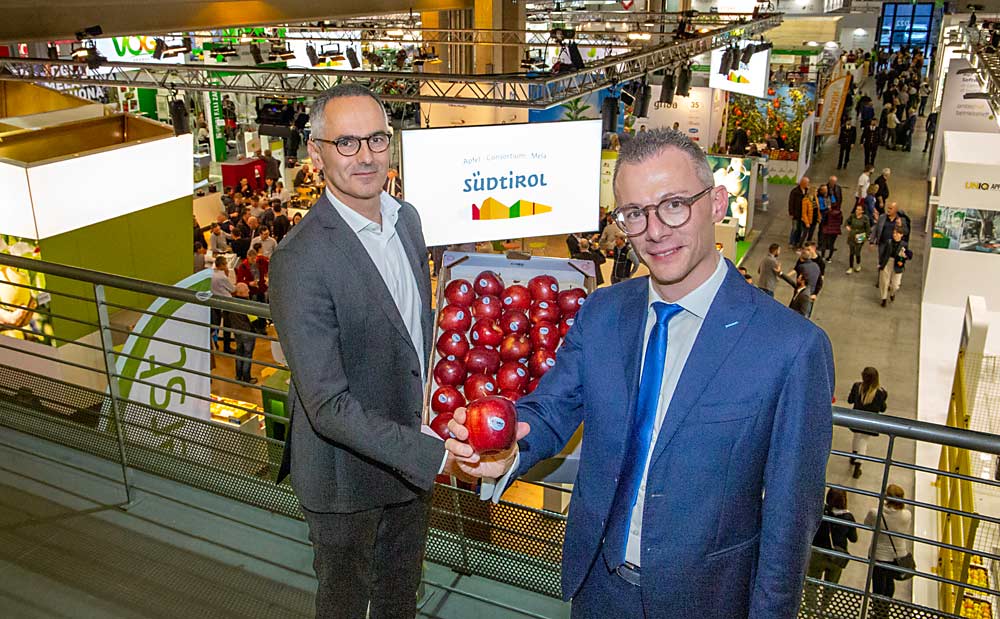
As the WA 38 apple soars up the production charts in Washington, fruit from growing regions outside the U.S. is just starting to hit store shelves.
Italian growers have the lead, with a modest haul of WA 38 for their second year putting fruit on the market under the Cosmic Crisp brand. They first planted in 2019. Australia, New Zealand and Argentina expect scant volumes from trees planted in 2020 and 2021.
“The intention was always to build a global brand, and we’re stepping forward and doing that now,” said Kevin Brandt, vice president of Proprietary Variety Management, the Yakima company contracted by Washington State University to commercially launch WSU’s signature new variety.
However, things most likely will move slowly in Europe, marketers say, especially in Italy where shoppers proclaim a traditional and regional relationship with food — branding cheese, meat, olive oil and wine by region. They often turn up their noses at produce out of season.
VOG and VIP, the two Italian fruit production cooperatives licensed to sell Cosmic Crisp, harvested 5,000 metric tons in 2022. That’s about 276,000 40-pound boxes — hardly a blip for a country that produces 2.2 million metric tons of apples a year, ranking sixth in the world. And the companies don’t have the same ambitious expansion plans seen in Washington, where shippers measure Cosmic volumes in millions of boxes.
“The European consumers are more conservative in many countries than America,” said Walter Pardatscher, CEO of VOG, the larger of the two South Tyrol cooperatives. “They’re still eating Golden Delicious.”
The companies, which share marketing efforts regarding Cosmic Crisp, project about 35,000 tons once the trees reach full maturity in 2026. That’s only 0.3 percent of the average European volume of 12 million tons.
VOG and VIP are intentionally keeping their own shares modest. They collectively have about 40,000 acres of apples, only 1,280 in WA 38. Meanwhile, Golden Delicious makes up about 60 percent of VOG’s apple portfolio.
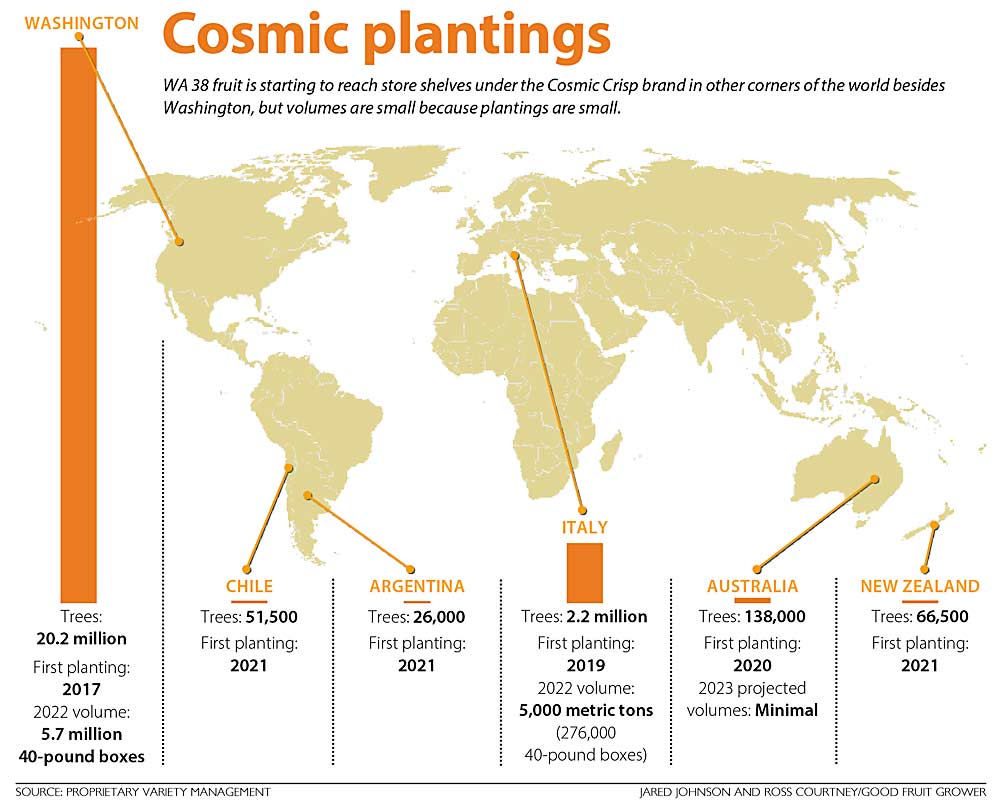
Pardatscher and Fabio Zanesco, CEO of VIP, expect interest to grow with time.
Italians may be traditional, but they do eat branded varieties. Cripps Pink is usually seen on store shelves and in urban produce stands, sometimes under the brand Pink Lady, sometimes with the generic cultivar name.
Brandt also expects interest to pick up eventually, though all consumers want different things. The light and juicy Honeycrisp may sell like hotcakes in America, but Europeans favor dense apples such as Cripps Pink and Golden Delicious, he said.
The WA 38 was bred by WSU and first planted in 2017 as a public, managed variety for all Washington producers. Growers elsewhere in North America must wait until at least 2027 to plant their own trees.
Proprietary Variety Management, or PVM, has intentionally limited trees available to the far-flung regions of the globe, Brandt said. Washington has more than 20 million WA 38 trees in the ground. Italy is second with 2.2 million, followed by Australia with only 138,000.
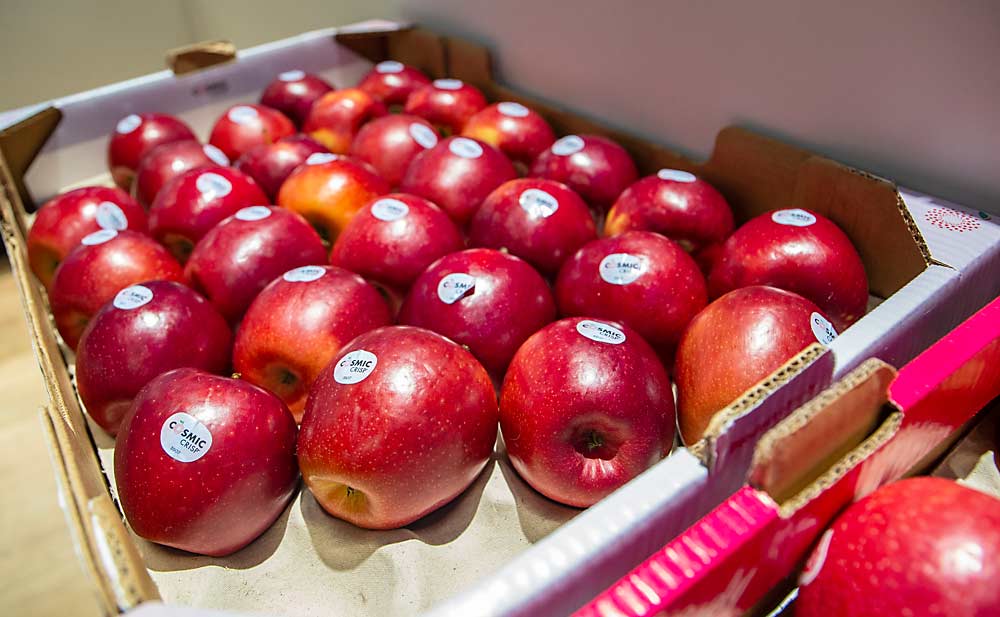
Meanwhile, volume projections for Washington’s WA 38 crop have mellowed.
In 2022, Washington harvested about 5.8 million 40-pound box equivalents, while PVM predicts 7.5 million boxes in 2023, 9.8 million in 2024 and 11.5 million in 2025.
Those are a far cry from some past predictions, one of which called for more than 10 million boxes in 2022.
“This is always a moving target and is adjusted as we learn from year to year,” Brandt said.
Also, WA 38 packouts are lower than normal due to erratic weather the past two years, including the late, frosty spring in 2022, Brandt said. PVM inspectors have noticed a higher incidence of frost ring in the calyx. Honeycrisp, one of WA 38’s breeding parents, has similar problems.
PVM and WSU released Cosmic Crisp apples for shipping on Dec. 1.
—by Ross Courtney

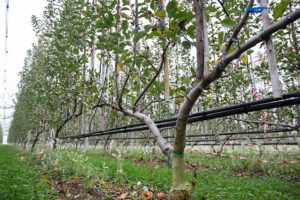
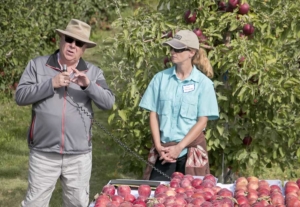





Leave A Comment